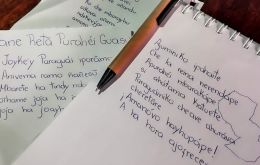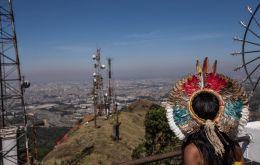MercoPress. South Atlantic News Agency
Tag: Guarani
-
Wednesday, January 14th 2026 - 10:22 UTC
Pressure mounts for Foreign med students in Paraguay to be proficient in Spanish and Guarani

The Paraguayan Medical Circle (CPM) has issued a formal demand for strict linguistic competency requirements for all foreign medical students. The guild insists that non-native speakers must obtain official certifications in Spanish and Guaraní as a prerequisite for enrollment and clinical practice.
-
Friday, August 26th 2022 - 09:44 UTC
Day of the Guaraní language celebrated in Paraguay

Marking another anniversary of the enacting of Paraguay's Constitution of 1967 which declared it as the country's second official language, local authorities Thursday celebrated one new episode of Guarani Language Day. The country's other official language is, of course, Spanish.
-
Thursday, July 21st 2022 - 08:28 UTC
College-like education program launched for teachers of Guarani

Education authorities in the Argentine province of Corrientes Wednesday launched a variety of Guarani programs whereby students can get various college-type degrees for the teaching of the ancestral language.
-
Friday, May 13th 2022 - 09:36 UTC
Google's translating tool adds Guarani, Aymara and Quechua to its menu

Google CEO Sundar Pichai has announced the company will add 24 new languages to its widespread translating tool, including Guarani, Aymara and Quechua, which are spoken by native communities in South America.
-
Friday, April 29th 2022 - 09:00 UTC
Asunción City Hall declares local species to be animals of value

The City Hall of Paraguay's capital has this week declared the weasel, also known locally for its Guarani name mykurẽ, as an animal of value and importance.
-
Saturday, December 18th 2021 - 09:20 UTC
Paraguay insists civil servants must wear clothes made of traditional fabric

The Government of Paraguay has issued a decree whereby civil servants are encouraged to wear clothing made of the ancestral ao po'i fabric on Fridays to promote and protect the country's heritage.
-
Friday, October 29th 2021 - 08:45 UTC
Argentina: Paraguayan guaraní becomes hard currency in the absence of US dollar bills

The demand for Paraguayan guaranís in the Argentine province of Misiones has been developed as desperate locals are unable to find US dollar bills with which to protect their savings from rampant devaluation and growing inflation, it was reported.
-
Friday, September 17th 2021 - 08:20 UTC
São Paulo Mayor wants Guarani to become city's 2nd language

São Paulo Mayor Ricardo Nunes Thursday sent a by to the local City Council whereby Guarani would be declared the second official language of South America's largest city.
-
Wednesday, September 10th 2014 - 04:29 UTC
Paraguay argues that soccer was first played by Guarani tribes, according to Jesuit reports

The Guarani tribes that lived in South America in the 17th century used to play a sport similar to soccer when the Jesuits arrived to establish their missions, claims a video based on historical documents released by Paraguay’s Secretary for Culture. Entitled “The Guaranies invented soccer,” the video collects findings made by anthropologists who studied the Jesuits’ legacy in the country.
-
Wednesday, June 5th 2013 - 07:46 UTC
Brazil indigenous peoples clash with farmers and dams builders: demand respect for ancestral lands

Lawmakers from the Brazilian farm state of Mato Grosso do Sul asked President Dilma Rousseff's government to send troops to end land invasions by Indigenous people claiming their ancestral territory.
